|
|
|
Sort Order |
|
|
|
Items / Page
|
|
|
|
|
|
|
| Srl | Item |
| 1 |
ID:
187935


|
|
|
|
|
| Summary/Abstract |
Urban governance has been increasingly complicated by the rapid development of emerging industries in recent years. One example is the boom of China's intelligent connected vehicle (ICV) industry, in which governments and business interests are increasingly complicated in co-constructing a context-specific "framework of action" to tap the potential of new industries in managing radical urban development uncertainty. Against this background, this article examines the ICV industries in Hunan Xiangjiang New Area (HXNA), a national new area in Central China's inland province of Hunan. Despite keen competition from coastal cities, HXNA has managed to develop the ICV industry as its flagship sector to propel local economic development. Through tracing the ICV-induced development, this article demonstrates that HXNA's success owes much to a dynamic state–business interaction rarely seen in traditional industrial sectors. To explicate this interaction, this article seeks to move beyond the dichotomy between business-centric and state-centric interpretations of entrepreneurial urban governance to argue that state–business interactions are neither unidirectional nor fixed, but bidirectional, malleable and evolving constantly. Our findings underscore the importance of understanding the entrepreneurial economic landscape as co-shaped by both the state and firms in a temporally dynamic manner.
|
|
|
|
|
|
|
|
|
|
|
|
|
|
|
|
| 2 |
ID:
108220


|
|
|
| 3 |
ID:
180687
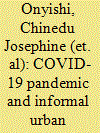

|
|
|
|
|
| Summary/Abstract |
The outbreak and spread of coronavirus disease (COVID-19) is probably the most serious global challenge since World War II. While research has paid considerable attention to the technical, epidemiological and public health aspects of the pandemic in Africa, it neglects the social, economic and political dimensions. Relying on analysis of data on trends of COVID-19 infections from the World Health Organization and Africa Centres for Disease Control and Prevention, and a rapid review of available international and national policy/programme documents on COVID-19 control responses in Africa, this study assessed the extant protocols and responses to COVID-19 in relation to urban governance principles. Utilizing the political economy framework, the social conditions of informal labour and business activities during the COVID-19 pandemic are explored with accession to social habitus of informality. The paper argues that in as much as the COVID-19 pandemic is a pervasive health problem it should be treated more as a social and political economy challenge given the large informal nature of urbanism in Africa. The study concludes that urban governance that incorporates collective organization, community groups, non-state and informal actors offers scope in the battle against COVID-19 in Africa. Rethinking African urbanism in line with the principles of the Global Campaign on Urban Governance is also canvassed.
|
|
|
|
|
|
|
|
|
|
|
|
|
|
|
|
| 4 |
ID:
128524
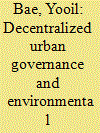

|
|
|
|
|
| Publication |
2013.
|
| Summary/Abstract |
This paper explores how decentralization has created a "local political arena" and has been transforming governance in the environmental management sector in South Korea. Korea has been known as a developmental state where the strong central government and businesses have conspicuously dominated during most of its industrialization period. Yet, the deepened democracy, global competitiveness and fiscal austerity have pressured central political stakeholders to devolve highly centralized functions and authority to local bodies since the mid-1990s. The building of democratic institutions at the local level, including directly elected mayors and city councils, has created room for local politics and diminished central political leverage over local affairs. The national economic crisis has highlighted the inefficiency of the centralized system and encouraged further administrative and fiscal decentralization under the democratic governments. In this issue image_86_4_Baecontext, while the central government and big businesses continue to have a significant say in policy making, local executives, with their expanded decisional authority and resources, are trying to improve the images of their cities and to take responsibility for promoting urban economies and improving quality of life in the age of trans-border links and competition. This paper analyzes the case of Ulsan, where Hyundai and several other conglomerates are located and which has been a symbol of state-led industrialization during most of the development period. Despite the large role played by the centre in the development of Ulsan, the empowered mayor of the city has successfully turned citizens' attention to post-industrial aspects of governance for ensuring the future competitiveness of the city in global markets by orchestrating collaborative implementation of environmental policies. The paper explores how this governance shift in Ulsan has led successful collaborative environmental change by mobilizing local businesses, civic organizations and general citizens who might not have been interested in the making of an "environment-friendly city
|
|
|
|
|
|
|
|
|
|
|
|
|
|
|
|
| 5 |
ID:
090906
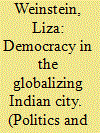

|
|
|
|
|
| Publication |
2009.
|
| Summary/Abstract |
Transformations under way in Indian cities have begun to alter the opportunities for democratic participation among the urban poor. Highlighting efforts to promote globally oriented urban developments in Mumbai, this article examines the state's engagement with groups directly impacted by these efforts. Based on ethnographic research and interviews with key stakeholders in the Dharavi Redevelopment Project (DRP), the article traces the character of such engagements over the project's four-year planning process. It finds that the state undertook an unusually inclusive process, consulting with resident and activist groups at points throughout this period. The article posits that this novel engagement is an unintended consequence of pressures to promote rapid development and ease investor concerns. Situating this case in the recent literature on political shifts in the globalizing Indian city, it concludes that the state may be engaging more with the urban poor than many of these accounts suggest.
|
|
|
|
|
|
|
|
|
|
|
|
|
|
|
|
| 6 |
ID:
081716


|
|
|
|
|
| Publication |
2008.
|
| Summary/Abstract |
The role of urban local governments in India has become extremely challenging. To ensure that demands of the urban population are addressed properly, the Indian government has initiated various policy reforms to strengthen local governments. This article describes the form of urban local government in India in the context of recent municipal reforms. Evolution of municipalities, their typology and constitution, legislation, duties, composition, management and finance practices are some aspects covered. It is concluded that municipalities in India are being empowered in various ways with the intention that they would emerge as viable units of governance at the local level.
|
|
|
|
|
|
|
|
|
|
|
|
|
|
|
|
| 7 |
ID:
192182
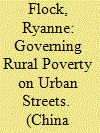

|
|
|
|
|
| Summary/Abstract |
This study investigates how discourses on panhandling intertwine with the governance of beggars on China's urban streets. It focuses on local policy implementation in Guangzhou city, led by the bureau of civil affairs along with its centres for “custody and repatriation” and “assistance stations.” The study aims to understand how the state regulates panhandling and engages with beggars in public spaces. Exploring the internal logic of the state's approach and how it has changed during the 40 years of reform, it also considers the junctures at which contradictions and conflicts arise. Based on fieldwork data (2011 to 2014) and the analysis of government documents, yearbooks, academic and mass media discourses, I argue that the state's treatment of panhandlers poses a conundrum as welfare measures conflict with control. While several layers of state regulation and actors contradict each other and create grey areas of state-induced informality, people who beg for alms are continuously criminalized and excluded from public space.
|
|
|
|
|
|
|
|
|
|
|
|
|
|
|
|
| 8 |
ID:
171504


|
|
|
|
|
| Summary/Abstract |
This article evaluates the opportunities and limitations of network governance to support low-carbon energy transitions in European cities. Network visualization and statistical measures of network structure are combined with qualitative case study data to provide a comparative analysis of energy transition networks in Birmingham, Budapest and Frankfurt. Data reveal that existing networks differ in extent, integration and distribution of authority. Contextual characteristics help explain these differences, highlighting the importance of path dependencies and disjunctions in each city. These findings represent important considerations for the Transition Management model which aims specifically at governing sustainability transitions via network governance. Responding to a gap in the literature we demonstrate that Transition Management must be considered as an intervention into locationally specific settings and existing networks. The design of network structures and processes, as well as role of any ‘transition manager’, must reflect contextual factors and existing network considerations. Failure to account for contextual differences limits the model’s capacity to contribute to sustainable energy transitions in different cities.
|
|
|
|
|
|
|
|
|
|
|
|
|
|
|
|
| 9 |
ID:
074500
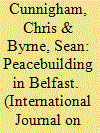

|
|
|
|
|
| Publication |
2006.
|
| Summary/Abstract |
Urban planners can partially direct conflict, toward either resolution or escalation. The British-controlled Northern Ireland Executive (NIE) has enacted urban policies intended to be impartial and inoffensive to either community. But, in doing so, urban planning has surrendered potential in helping create urban conditions conducive to peace. This paper examines how NIE policy has impacted intergroup tensions in Belfast. The history of Belfast urban policy attitudes is explored, focusing on the period between 1972 and 1999, when London assumed direct control of urban governance. As the peace process in Northern Ireland has today reached a new crossroads, this study seeks to identify important issues of Belfast urban policymaking in need of revision.
|
|
|
|
|
|
|
|
|
|
|
|
|
|
|
|
| 10 |
ID:
147325
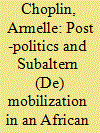

|
|
|
|
|
| Summary/Abstract |
Whereas some scholars have shown that urban contexts are the best place for mobilization, some others have argued that the contemporary complex governance transforms the city into a “post-political” space. Focusing on urban residents’ reactions to slum clearance in Nouakchott, the capital city of Mauritania, this paper seeks to explore these two opposite theses about politics in the Southern urban contexts – the quiet encroachment paradigm versus the post-political thought. Both dynamics are useful and complementary according to the scale of analysis: depoliticization on the level of urban governance and politicization on the level of popular politics.
|
|
|
|
|
|
|
|
|
|
|
|
|
|
|
|
| 11 |
ID:
129099
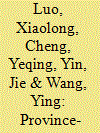

|
|
|
|
|
| Publication |
2014.
|
| Summary/Abstract |
Scalar relations have been restructured in the contemporary capitalism. in post-reform China. many scalars are transformed and constructed with the transition from state socialism to market economy. This article examines the process of rescaling state power from the perspective of politics of scale. using a case of province-jading-city reform in Jiangsu province. By examining the role of government at various levels in the province-leading-city reform. it is argued that the province-leading-city reform is a rescaling of state power. involving up-scaling and down-scaling of powers. Due to power reshuffling in the rescaling process. there are intense power struggles among scalars in both vertical and horizontal dimensions. With the deepening process of globalization. marketization. and decentralization. China's cities and regions have undergone dramatic economic and political restructuring since the late l970s. There emerges consider-
able acidotic and policy interests in China's changing urban and regional governance after the launch of economic reforms and open-door policy. especially after 2000.' On the urban scale. China's changing
governance has been the focus of previous studies? By cautiously borrowing Western urban theories. such as urban regime. growth coalition. and entrepreneurial city. scholars have argued that transitional China shares stone similarities with Western societies, but there are still differences in urban governance due to a strong government or tight social control."
|
|
|
|
|
|
|
|
|
|
|
|
|
|
|
|
| 12 |
ID:
165765


|
|
|
|
|
| Summary/Abstract |
This article uses the case of illegal street vending in Harare to explore the interface between urban governance and politics. Drawing on the ideas of urban governance and informal governance, it illustrates how polarisation between the opposition political party Movement for Democratic Change-dominated municipal council and the Zimbabwe African National Union Patriotic Front-led government is affecting governance in general and in particular Harare municipality’s ability to handle the illegal street vending problem. While the paper essentially identifies political expediency as the major reason why a lasting solution is elusive in handling the illegal street vending problem, it acknowledges that there are broad reasons for its persistence. Consequently, the article demonstrates some of the reasons why illegal street vending is difficult to end using the conventional methods and provides some alternatives.
|
|
|
|
|
|
|
|
|
|
|
|
|
|
|
|
| 13 |
ID:
189467
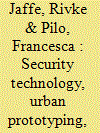

|
|
|
|
|
| Summary/Abstract |
In response to broader political and corporate tendencies towards ‘techno-solutionism’, critical studies of security technology highlight the threat that security technologies pose to civil rights and democratic accountability. This article argues for a slightly different perspective: rather than taking claims of technological efficacy at face value, it explores the multiple ways in which security-related technology so frequently fails to deliver its – confidently anticipated or feared – effects. A focus on sociotechnical failure can offer more comprehensive, on-the-ground understanding of the technopolitics of security. We suggest that these politics may lie precisely in the blurring of concepts of failure and success, as ‘prototyping’ and experimentation become an increasingly powerful logic of urban governance. This argument is developed through an analysis of security interventions in Jamaica, a context characterized by high levels of violent crime. The article focuses on three technologies that have been adapted to security-related purposes: a communication channel connecting police and private security guards, a public–private CCTV network, and a smart electricity grid. Drawing on approaches from science and technology studies, the article adopts a process-oriented approach, attending to both the discourses surrounding the introduction of these technologies and their everyday interactions with their social and built environments.
|
|
|
|
|
|
|
|
|
|
|
|
|
|
|
|
| 14 |
ID:
063285


|
|
|
|
|
| Publication |
New Delhi, Allied, 2005.
|
| Description |
xvi, 516p.
|
| Standard Number |
8177648314
|
|
|
|
|
|
|
|
|
|
|
|
Copies: C:1/I:0,R:0,Q:0
Circulation
| Accession# | Call# | Current Location | Status | Policy | Location |
| 049796 | 320.8/JAG 049796 | Main | On Shelf | General | |
|
|
|
|
| 15 |
ID:
192905
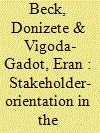

|
|
|
|
|
| Summary/Abstract |
Stakeholder-orientation is useful for managing conflicts between stakeholders and strategizing urban sustainability. This qualitative meta-analysis explores the characteristics and challenges of stakeholder-orientation in the governance of Israeli cities and local communities. Main findings: (1) migrants and immigrants, third sector and civil society movements, and religious groups are more protagonists in the Israeli urban governance in comparison to general urban contexts; (2) Though influenced by communicative planning, more effort should be made to strengthen stakeholder-orientation as a sustainable urban strategy; and (3) The power of networks has its attention increased in Israeli urban governance as in other contexts worldwide.
|
|
|
|
|
|
|
|
|
|
|
|
|
|
|
|
| 16 |
ID:
146513


|
|
|
|
|
| Summary/Abstract |
Conflicts between urban street vendors and city regulators have become a common urban sight in Chinese cities today. This paper considers how visions of modern urban streets and sidewalks have helped to generate increasingly restrictive policies on street vending and spurred new forms of urban regulation and policing. While mostly an everyday routine of Chinese city life, the resulting vendor–chengguan conflicts dramatize state power in public and carry the latent danger of crowd violence in response. In particular, aggressive policing of highly visible city streets can at times produce a volatile “politics of the street” involving episodes of vendor resistance and even dramatic expressions of bystander solidarity which challenge these street-level expressions of state power.
|
|
|
|
|
|
|
|
|
|
|
|
|
|
|
|
| 17 |
ID:
080463
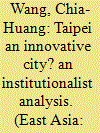

|
|
|
|
|
| Publication |
2007.
|
| Summary/Abstract |
This paper explores whether Taipei is an innovative city by critically examining Taipei's industrial and economic performance, developmental visions and spatial planning, as well as institutional settings and political contexts. With the aid of institutionalist perspective, the author argues that Taipei's innovative efforts are mostly policy innovation, rather than institutional innovation. The author also describes the institutional dynamics that have caused the lack of Taipei's institutional innovation. The case study of Taipei could be helpful in conducting comparative studies on urban innovation
|
|
|
|
|
|
|
|
|
|
|
|
|
|
|
|
| 18 |
ID:
129079
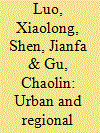

|
|
|
|
|
| Publication |
2014.
|
| Summary/Abstract |
In the age of globalization and social-spatial restructuring. cities and regions have become the focus of social and economic changes and governance.' Over the past decade. extensive studies have been contacted on hanging urban and regional governance in transitional China} The articles included in this special issue further enhance our understanding of China's urban and regional governance and restructuring. This introduction summarizes the major findings of these articles and proposes some suggestions for future research. The articles in this issue were originally presented at the International Conference "Urban and Regional Governance in China: Retrospect and Prospect of IO Years of Research" held at Nanjing University. Nanjing. from I to 2 July 2()l2. The conference was jointly organized by the Department of Urban Planning and Design & Research Centre of Human Geography at Nanjing University and the Urban and Regional Development Programme.
|
|
|
|
|
|
|
|
|
|
|
|
|
|
|
|
| 19 |
ID:
144847
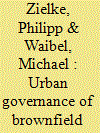

|
|
|
|
|
| Summary/Abstract |
Over the past several years, the creative reuse of brownfields has played a major role in Chinese cities to give their urban landscape a so-called second development. This paper analyses the governance of the brownfield restructuring in Guangzhou (Canton). The research is based on a study of the T.I.T Creative Industry Zone, a highly successful creative space currently in danger of demolition. This paper follows DiGaetano and Strom's (2003) analytical governance framework. This approach allows for deciphering the complexities of decision-making through a well-structured set of interdependent categories. In Guangzhou, new policies and institutions have been promoting the restructuring and have contributed to the formalisation of public–private interactions. In general, this indicates a shift towards a more corporatist governance. However, the study of T.I.T reveals a rather intricate picture: the policymaking remains influenced by a top-down authoritative style – sometimes in an arbitrary manner – and to some extent also by particularistic exchanges. This indicates a complex mode of urban governance consisting of increasingly corporatist elements but still with managerial, and to a lesser extent, clientelistic elements. Finally, the coexistence of different governance modes seems to be a typical outcome of China's transition while still remaining more adaptive, experimental and flexible in nature.
|
|
|
|
|
|
|
|
|
|
|
|
|
|
|
|
| 20 |
ID:
157200
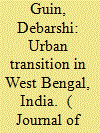

|
|
|
|
|
| Summary/Abstract |
Contemporary urbanization in India is in transition and this, along with the continuation of a ‘top heavy’ urban structure and gradual deindustrialization, is characterized by faster growth of informal employment, a declining trend of urban-ward migration of males, the slow down in the growth of cities and towns and the emergence of new urban centres. Given this immediate backdrop, this paper examines the contemporary processes and emerging forms of urban transition in West Bengal, with its longstanding history of ‘mono-centric’ urbanization. It reveals that urbanization in the state is no longer confined to a few pockets, as many new urban centres have emerged away from them and small towns are growing at relatively faster rates compared to the cities. But the underlying factors of this transition are not associated with the dispersal of economic activities and employment opportunities away from the metropolises. Furthermore, the study is sceptical about the significance of this emerging form of urbanization fuelled by the growth of small cities and towns which have a weak economic base, a crisis of urban governance and inadequate access to basic amenities.
|
|
|
|
|
|
|
|
|
|
|
|
|
|
|
|
|
|
|
|
|